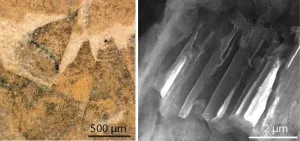(Press-News.org) Prior authorization—the process by which a health insurance company denies or approves coverage for a health care service before the service is performed—became standard practice beginning with Medicare and Medicaid legislation in the 1960s.
Although research has uncovered disparities in prior coverage for cancer patients based on race, little has been known to date on the role of prior authorization in increasing or decreasing these disparities.
To learn more about the issue, Benjamin Ukert, PhD, an assistant professor of health policy and management in the Texas A&M University School of Public Health, and a colleague at Penn State conducted a retrospective study of data provided by a major national commercial insurance provider on 18,041 patients diagnosed with cancer between Jan. 1, 2017, and April 1, 2020.
“Data on provider-insurer prior authorization is difficult to access and analyze, but this research could provide valuable information on equity in the prior authorization process in specialty care for patients, health care provers and plan managers, policy makers and employers.”
For the study, Ukert described the racial and ethnic composition of the data used in terms of prior authorization process outcomes for self-insured and fully insured adults diagnosed with the 13 most common cancers other than basal cell carcinomas, which generally do not require a prior authorization. Subjects had at least two Evaluation and Management office visit claims with a cancer diagnosis or one cancer diagnosis during an emergency department or inpatient stay during the study period.
For prior authorization data, Ukert analyzed the length of days from the cancer diagnosis to the prior authorization, the decision to deny or approve the service, and if the denial resulted from medical necessity
Independent variables were self-reported race or ethnicity provided by employers and electronic medical records and drawn from the sociodemographic data for covered individuals available from the insurer. Racial categories were non-Hispanic White, non-Hispanic Asian, non-Hispanic Black and Hispanic (either Hispanic-White or Hispanic-Black).
For covariates, Ukert used a large set of sociodemographic control variables identified from the medical claims and the American Community Survey. Others included sociodemographic information, including information about health insurance coverage, and length of health plan enrollment prior to the cancer diagnosis. After measuring the extent of any comorbidities for the six months before the cancer diagnosis, Ukert merged the block group characteristics on household income and education level from the five-year 2017 American Community Survey. He then used linear regression models to evaluate whether disparities by race or ethnicity emerged in prior authorization process outcomes.
The sample was 85 percent White, 3 percent Asian, 10 percent Black, and 1 percent Hispanic, 64 percent were female and the average age was 53. The average prior authorization denial rate was 10 percent and the denial rate specifically due to medical necessity was 5 percent. Those who identified as Hispanic had the highest prior authorization denial rate at 12 percent, while those who identified as Black had the lowest prior authorization denial rate at 8 percent.
“In short, we found no racial or ethnic disparities in prior authorization outcomes for individuals identifying as Black and Hispanic, compared to White,” Ukert said. “In addition, Asian patients had higher rates of prior authorization approvals compared to White patients.”
By Ann Kellett, Texas A&M University School of Public Health
END
Health insurers have required prior authorization for services for decades—but have they treated patients equitably?
New study evaluates racial disparities in prior authorization outcomes by a major national insurer
2024-08-01
ELSE PRESS RELEASES FROM THIS DATE:
Trying to limit calories? Skip the dip, researchers advise
2024-08-01
UNIVERSITY PARK, Pa. — Snacks provide, on average, about one-fourth of most people’s daily calories. With nearly one in three adults in the United States overweight and more than two in five with obesity, according to the National Institutes of Health, researchers in the Penn State Sensory Evaluation Center are investigating how Americans can snack smarter.
The latest study conducted in the center, housed in the College of Agricultural Sciences, investigated how eating behavior changes when consumers are served a dip with a salty snack. The findings, available online now and to be published in the November issue ...
Innovation Crossroads welcomes seven entrepreneurs for Cohort 2024
2024-08-01
Seven entrepreneurs comprise the next cohort of Innovation Crossroads, a Department of Energy Lab-Embedded Entrepreneurship Program node based at Oak Ridge National Laboratory. The program provides energy-related startup founders from across the nation with access to ORNL’s unique scientific resources and capabilities, as well as connect them with experts, mentors and networks to accelerate their efforts to take their world-changing ideas to the marketplace.
“Supporting the next generation of entrepreneurs is part of ORNL’s ...
American College of Rheumatology opens press registration for ACR Convergence 2024
2024-08-01
FOR IMMEDIATE RELEASE
Aug. 1, 2024
Media Contact:
Monica McDonald
(404) 365-2162
mmcdonald@rheumatology.org
American College of Rheumatology Opens Press Registration for ACR Convergence 2024
ATLANTA – Complimentary press registration is now open for journalists to cover research presented at ACR Convergence 2024, taking place Nov. 14-19 at the Walter E. Washington Convention Center in Washington, D.C. A listing of sessions for the meeting can be found in the online program.
Approved ...
Half a billion-year-old spiny slug reveals the origins of mollusks
2024-08-01
UNDER EMBARGO UNTIL 19:00 BST / 14:00 ET THURSDAY 1 AUGUST 2024
Images available via link in the notes section
Exceptional fossils with preserved soft parts reveal that the earliest molluscs were flat, armoured slugs without shells.
The new species, Shishania aculeata was covered with hollow, organic, cone-shaped spines.
The fossils preserve exceptionally rare detailed features which reveal that these spines were produced using a sophisticated secretion system that is shared with annelids (earthworms and relatives).
A team of researchers including scientists from the University of Oxford have made an astonishing discovery of ...
Award-winning research maps the body’s internal sensory communication highway
2024-08-01
When the question is “how are you feeling on the inside?,” it’s our vagus nerve that offers the answer.
But how does the body’s longest cranial nerve, running from brain to large intestine, encodes sensory information from the visceral organs? For his work investigating and mapping this internal information highway, Qiancheng Zhao is the 2024 grand prize winner of the Science & PINS Prize for Neuromodulation.
Interoception—the body’s ability to sense its internal state in a timely and precise manner—facilitated by the vagus plays a key role in respiratory, gastrointestinal, cardiovascular, endocrine and immune ...
Current Andean glacier loss is unprecedented in the Holocene
2024-08-01
Andean tropical glaciers are experiencing unprecedented retreat, according to a new study that reveals their current sizes are the smallest in over 11,700 years. “Our finding … identifies this region as a hot spot in our understanding of the changing state of the cryosphere,” say the authors. Glaciers act as important indicators of climate change, with their global retreat accelerating over recent decades. Examining this retreat in the context of the previous 11,700 years of the Holocene interglacial highlights the impact of modern global warming. Although many glaciers worldwide are smaller today compared to ...
New fossil resembling a bristly durian fruit reveals insights into the origin of molluscan skeletons
2024-08-01
The early evolution of mollusks has been hard to pin down, but now a newly discovered fossil – of a shell-less, soft-bodied, spiny mollusk from the early Cambrian – provides crucial insights, researchers report. The findings suggest that this fossil, of a creature called Shishania aculeata, is a stem mollusk – representative of an intermediate between early members of the superphylum lophotrochozoans and more derived mollusks. Mollusks are one of the most diverse groups of animals, encompassing various well-known forms such as clams, ...
CLEAR: a new approach to 3D printing materials with highly entangled polymer networks
2024-08-01
Researchers have developed a novel approach to three-dimensional (3D) printing they call “CLEAR,” which significantly improves the strength and durability of materials by using a combination of light and dark chemical reactions to create densely entangled polymer chains. The authors used their approach to print structures with special features, such as the ability to adhere to wet tissues. Incorporation of polymer chain entanglements as reinforcements within 3D printed materials can significantly enhance their mechanical properties. However, traditional vat photopolymerization-based 3D printing techniques, such as digital ...
Genetic insights into how prickles develop across different plants, despite evolutionary separation
2024-08-01
The evolutionary gain and loss of plant prickles – sharp pointed epidermal outgrowths – are controlled by a shared genetic program involving cytokinin biosynthesis, researchers report. The study sheds light on the genetic basis of the emergence of similar traits in distantly related organisms and reveals genomic targets for prickle removal for crop improvement. The genetic basis of trait convergence is a central question in evolutionary biology, and the extent to which it is driven by ...
Climate anomalies may play a major role in driving cholera pandemics
2024-08-01
New research suggests that an El Niño event may have aided the establishment and spread of a novel cholera strain during an early 20th-century pandemic, supporting the idea that climate anomalies could create opportunities for the emergence of new cholera strains. Xavier Rodo of Instituto de Salud Global de Barcelona, Spain, and colleagues present these findings in the open-access journal PLOS Neglected Tropical Diseases.
Since 1961, more than 1 million people worldwide have died in an ongoing cholera pandemic, the seventh cholera ...
LAST 30 PRESS RELEASES:
How periodontitis-linked bacteria accelerate osteoporosis-like bone loss through the gut
Understanding how cells take up and use isolated ‘powerhouses’ to restore energy function
Ten-point plan to deliver climate education unveiled by experts
Team led by UC San Diego researchers selected for prestigious global cancer prize
Study: Reported crop yield gains from breeding may be overstated
Stem cells from human baby teeth show promise for treating cerebral palsy
Chimps’ love for crystals could help us understand our own ancestors’ fascination with these stones
Vaginal estrogen therapy not linked to cancer recurrence in survivors of endometrial cancer
How estrogen helps protect women from high blood pressure
Breaking the efficiency barrier: Researchers propose multi-stage solar system to harness the full spectrum
A new name, a new beginning: Building a green energy future together
From algorithms to atoms: How artificial intelligence is accelerating the discovery of next-generation energy materials
Loneliness linked to fear of embarrassment: teen research
New MOH–NUS Fellowship launched to strengthen everyday ethics in Singapore’s healthcare sector
Sungkyunkwan University researchers develop next-generation transparent electrode without rare metal indium
What's going on inside quantum computers?: New method simplifies process tomography
This ancient plant-eater had a twisted jaw and sideways-facing teeth
Jackdaw chicks listen to adults to learn about predators
Toxic algal bloom has taken a heavy toll on mental health
Beyond silicon: SKKU team presents Indium Selenide roadmap for ultra-low-power AI and quantum computing
Sugar comforts newborn babies during painful procedures
Pollen exposure linked to poorer exam results taken at the end of secondary school
7 hours 18 mins may be optimal sleep length for avoiding type 2 diabetes precursor
Around 6 deaths a year linked to clubbing in the UK
Children’s development set back years by Covid lockdowns, study reveals
Four decades of data give unique insight into the Sun’s inner life
Urban trees can absorb more CO₂ than cars emit during summer
Fund for Science and Technology awards $15 million to Scripps Oceanography
New NIH grant advances Lupus protein research
New farm-scale biochar system could cut agricultural emissions by 75 percent while removing carbon from the atmosphere
[Press-News.org] Health insurers have required prior authorization for services for decades—but have they treated patients equitably?New study evaluates racial disparities in prior authorization outcomes by a major national insurer



